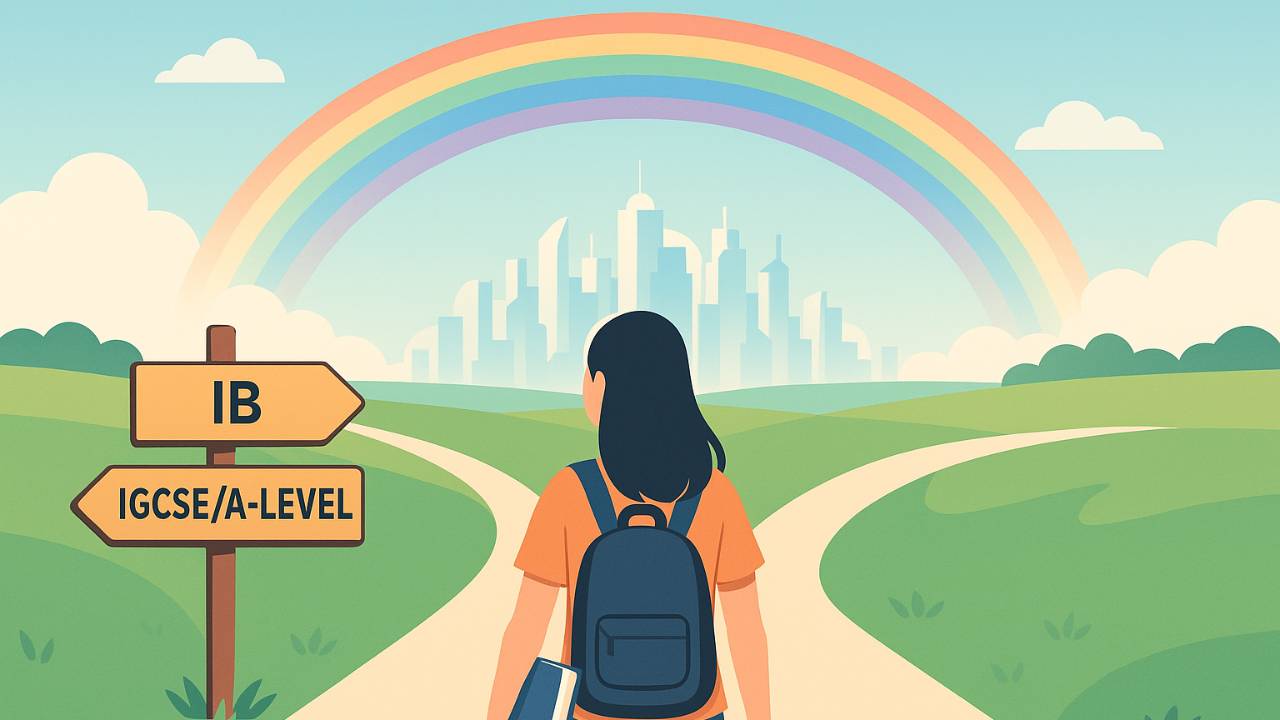
IGCSE or IB? A Quick Guide to Help You Decide
Trying to choose between IGCSE/A-Levels and the IB? You’re not alone.
Many students and families face this important decision when looking for the best international education path. The good news? Both options are highly respected around the world—but they follow very different philosophies. This quick guide will help you understand the main differences and reflect on what might suit your learning style, goals, and personality.
Want to explore every detail?
I’ve written a complete, free report that you can download here:
IGCSE vs. IB: A Global Guide for Parents and Students
It breaks down every stage of education—Primary, Middle, and Secondary—and includes a decision-making flowchart to help you make the best choice.
Two International Paths, One Big Decision
The Cambridge Pathway (IGCSE and A-Levels) and the International Baccalaureate (IB) are both widely recognized by top universities and employers around the world. But they prepare students in very different ways—and understanding those differences can make all the difference in your learning journey.
Learning Style
-
Cambridge offers a more structured and subject-focused approach. Students study each subject independently and can specialize early—especially during A-Levels, where they typically choose 3 or 4 subjects to study in depth.
-
IB emphasizes breadth and integration. Even in the final two years, students study six subjects from a wide range of disciplines, including languages, sciences, mathematics, and the arts.
Ask yourself:
Do you prefer to go deep into a few subjects you love (Cambridge)?
Or do you enjoy exploring many areas at once and keeping your options open (IB)?
Assessment Style
-
Cambridge relies heavily on external exams, usually taken at the end of each course. There’s a clear syllabus and structured preparation.
-
IB includes a mix of coursework and final exams, with research essays, internal projects, and oral presentations forming part of the final grade.
Ask yourself:
Do you do well in time-limited exams and prefer a clear endpoint (Cambridge)?
Or do you perform better with continuous assessment and varied tasks (IB)?
Academic Goals and Specialization
-
Cambridge allows for early specialization. If you already have a clear career direction—like medicine, engineering, or law—this system lets you focus your studies toward those goals from age 16.
-
IB encourages well-rounded development, which is great if you want to keep doors open or enjoy linking different areas of knowledge.
Ask yourself:
Do you already know what you want to study after school (Cambridge)?
Or do you want to explore more before narrowing things down (IB)?
International Mobility and Recognition
-
Cambridge qualifications (IGCSE and A-Levels) are offered in over 10,000 schools across more than 160 countries. They’re extremely well known, particularly in British-style and international schools.
-
IB programmes are also global, offered in around 5,900 schools across over 160 countries. The consistent teaching approach and international-minded philosophy make it a strong choice for globally mobile families.
Good news:
Both Cambridge and IB are accepted by universities all over the world. If you perform well, either one can take you anywhere.
Practical Considerations
-
Cambridge may offer more flexible options, including private candidates and online learning platforms. Examination fees apply, but you can take only the subjects you need.
-
IB tends to be available only in authorized IB schools. The programme includes extra requirements like community service and research essays, which require more support and resources—and may come with higher tuition in some schools.
Still Unsure?
That’s completely normal.
Choosing between Cambridge and IB is a big decision—but it doesn’t have to be stressful.
That’s why I created a complete, free report that includes:
-
Clear comparisons at every stage: Primary, Middle, and Secondary
-
Pros and cons of each system
-
A visual flowchart to help you decide
-
Real-life examples to imagine what student life is like in each system
📥 Download the full guide here:
Cambridge vs. IB: A Global Guide for Parents and Students
Final Thoughts
There’s no “best” system—only what’s best for you.
Cambridge offers a structured, exam-focused journey that supports depth and early specialization. IB offers a holistic, project-rich environment that encourages balance, global awareness, and self-reflection.
Think about how you learn best. Think about what excites you.
And remember: whichever path you take, success comes from consistency, curiosity, and courage.
If you’re considering the Cambridge route and want support in IGCSE or A-Level Physics and Maths, I’ve built resources specifically for that. But no matter your path, I hope this guide helps you move forward with confidence.

